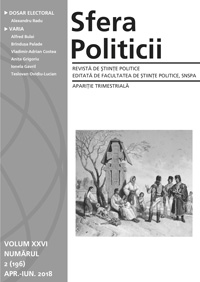Votanții activi și votanții de presiune. Un model teoretic de analiză
Active voters and pressure voters. A theoretical model of analysis
Author(s): Alfred BulaiSubject(s): Politics / Political Sciences, Political Theory, Political behavior
Published by: Fundaţia »Societatea Civilă« (FSC)
Keywords: active voters; pressure voters; referendum; economic vote; absenteeism; political interests; electoral costs
Summary/Abstract: The usual model of the analyses of voting absenteeism, for any type of election, is based on the thesis that people interested in the thematic of a vote, if they are not prevented in any way, will participate to it. Absenteeism is usually explained by to a lack of interest in the subject of choice, sometimes accompanied by the inability to understand the nature of the alternative that is proposed, or the difficulty of assessing variants of choice. Of course, in other cases absenteeism may be linked to the presence of a protest attitude against various political themes or actions. Beyond these factors of the absenteeism, which have their own explanatory capacity, I will try to propose another type of analysis of the voting mechanism and implicitly of the absenteeism. I will take the particular case of the referendum on redefinition of the family that took place in October 2018. I will show that the explanation of the very low level of presence to vote is mainly due to the existence of a critical mass of voters whom I will call “pressure voters”. Most of them did not vote at the referendum and usually, in the case of ordinary elections they are very difficult to identify.
Journal: Sfera Politicii
- Issue Year: XXVI/2018
- Issue No: 196
- Page Range: 30-38
- Page Count: 9
- Language: Romanian

